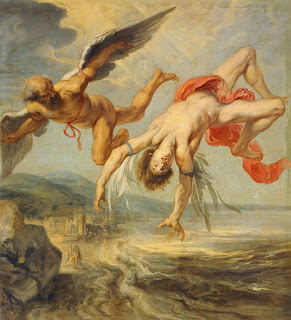Icarus
"Was Daedalus really stricken with grief when Icarus fell into the sea?
Or just disappointed by the design failure?"
Alison Bechdel, Fun Home (2007)
Jacob Peter Gowy
'The Fall Of Icarus',
1636-1637, Oil On Canvas, 195 X 180 cm
The story of Icarus, I submit, is not about Icarus; it is about Daedalus. Being a man of genius, it was Daedalus that set both himself and his son forth to freedom. He is still, however, a man. The labyrinth is the perfect symbol for his connection to the earth. He has mastered and created an earthly prison so intricate only he knows how to get out of it, and get out of it, he did. The way out is not further inside; it is to the skies. And that is the way both he and his son took.
Daedalus, before flight, did warn Icarus of two things: complacency, and hubris. Too complacent, and the wings will be too clogged with dampness; too much hubris, and the wax holding the wings together will melt.
Imagine Icarus hearing those words. Greek accounts tell us that he was so overwhelmed with giddiness in his flight that he ignored his father's warnings and deviated from Daedalus' path of flight, thus resulting to his fall to and death by the sea. The moral lesson, it is quite apparent, is to not fly too close to the sun.
But there are two warnings, remember. Failure results in being too low, or being too high. I am tempted to mention the Aristotelian golden mean here, but I will clog this whole imagery with yet other pretentious name-droppings. Let me stick to psychiatry instead.
The psychiatric mind could not miss the parallel between those two warnings with that of bipolar disorder: the lows of depression and the high of mania. Indeed, the Icarus complex, while highly debated, exists.
Why, though, did Icarus choose to ignore the warning against the sun, and not against the ocean?
Despite his warnings to the contrary and saying that flying too low is more dangerous because it is more deceptively safe, I would argue against Godin. It is, yes, within these two states that the bipolar person is at his dangerous: too low, and there is no will to live; and too high, and there is the ecstatic impulsivity and danger to the person. On the contrary, however, the sun, the ecstatic high, of bipolar disorder, is more destructive than its valley of depression. It is in here where the person lives dangerously, plays with fire (a fascination with literal fire, cathexis, is one so-called manifestation of the Icarus disorder), buys 40,000 shoes, eats seven boxes of pizza, has eleven one-night stands, adds another forty to the already 347 scars he has on his arm. It is the realm of hubris, where the bipolar mind thinks he can be a god.
We each have our own Daedalus, not our father, necessarily, but one who warns and guides us (and indeed in this case, literally shows us the way to go.) These people make us into who we are, again, not our fathers, necessarily, but people who mold ourselves into perhaps better versions of ourselves (or in this case, help us escape from the island of Crete, because we pissed off the king). Our Daedalii can be our family, our best friend, our lover. They are our earth, on which we are grounded, and who we will inevitably ignore. For we ourselves are creatures of the earth. We merely found someone of the same kind. The sun, the high of mania, makes possible an escape from the earth. The warning against the sun is more potent: Flight, after all, is more impossible, more godlike, more ecstatic, than swimming.
And when we ignore our Daedalii, do they grieve, or are they disappointed?
From Icarus' perspective, it doesn't matter. He has flown; and he is now dead.
It is our Daedalus that picks our bodies from the ocean, mourning silently, over what, we can only assume.
Or just disappointed by the design failure?"
Alison Bechdel, Fun Home (2007)
Jacob Peter Gowy
'The Fall Of Icarus',
1636-1637, Oil On Canvas, 195 X 180 cm
The story of Icarus, I submit, is not about Icarus; it is about Daedalus. Being a man of genius, it was Daedalus that set both himself and his son forth to freedom. He is still, however, a man. The labyrinth is the perfect symbol for his connection to the earth. He has mastered and created an earthly prison so intricate only he knows how to get out of it, and get out of it, he did. The way out is not further inside; it is to the skies. And that is the way both he and his son took.
Daedalus, before flight, did warn Icarus of two things: complacency, and hubris. Too complacent, and the wings will be too clogged with dampness; too much hubris, and the wax holding the wings together will melt.
Imagine Icarus hearing those words. Greek accounts tell us that he was so overwhelmed with giddiness in his flight that he ignored his father's warnings and deviated from Daedalus' path of flight, thus resulting to his fall to and death by the sea. The moral lesson, it is quite apparent, is to not fly too close to the sun.
But there are two warnings, remember. Failure results in being too low, or being too high. I am tempted to mention the Aristotelian golden mean here, but I will clog this whole imagery with yet other pretentious name-droppings. Let me stick to psychiatry instead.
The psychiatric mind could not miss the parallel between those two warnings with that of bipolar disorder: the lows of depression and the high of mania. Indeed, the Icarus complex, while highly debated, exists.
Why, though, did Icarus choose to ignore the warning against the sun, and not against the ocean?
Despite his warnings to the contrary and saying that flying too low is more dangerous because it is more deceptively safe, I would argue against Godin. It is, yes, within these two states that the bipolar person is at his dangerous: too low, and there is no will to live; and too high, and there is the ecstatic impulsivity and danger to the person. On the contrary, however, the sun, the ecstatic high, of bipolar disorder, is more destructive than its valley of depression. It is in here where the person lives dangerously, plays with fire (a fascination with literal fire, cathexis, is one so-called manifestation of the Icarus disorder), buys 40,000 shoes, eats seven boxes of pizza, has eleven one-night stands, adds another forty to the already 347 scars he has on his arm. It is the realm of hubris, where the bipolar mind thinks he can be a god.
We each have our own Daedalus, not our father, necessarily, but one who warns and guides us (and indeed in this case, literally shows us the way to go.) These people make us into who we are, again, not our fathers, necessarily, but people who mold ourselves into perhaps better versions of ourselves (or in this case, help us escape from the island of Crete, because we pissed off the king). Our Daedalii can be our family, our best friend, our lover. They are our earth, on which we are grounded, and who we will inevitably ignore. For we ourselves are creatures of the earth. We merely found someone of the same kind. The sun, the high of mania, makes possible an escape from the earth. The warning against the sun is more potent: Flight, after all, is more impossible, more godlike, more ecstatic, than swimming.
And when we ignore our Daedalii, do they grieve, or are they disappointed?
From Icarus' perspective, it doesn't matter. He has flown; and he is now dead.
It is our Daedalus that picks our bodies from the ocean, mourning silently, over what, we can only assume.



Comments
Post a Comment